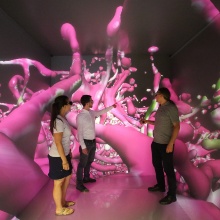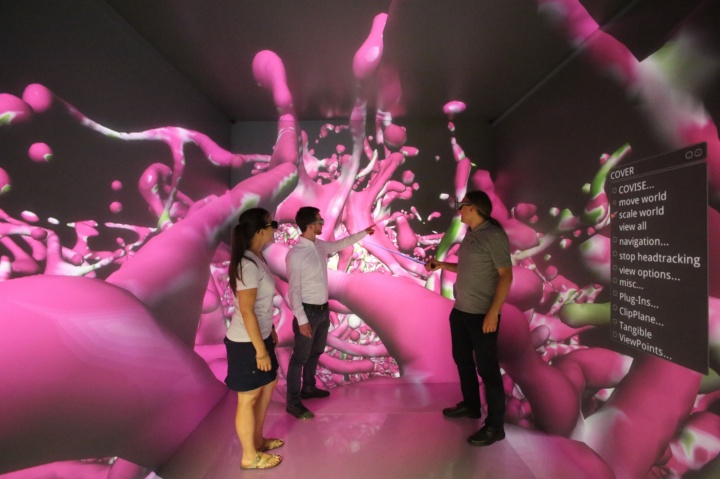By establishing and funding the National Research Data Infrastructure (NFDI) under the umbrella of the Joint Science Conference (GWK), the Federal Government and the federal states aim to make better use of the potential of research data for science in Germany. The NFDI is intended to set standards in data management and, as a digital, regionally distributed and networked knowledge repository, to ensure the storage and usability of research data on a sustainable basis. On 26 June 2020, the GWK decided on the funding of NFDI consortia based on a recommendation of the German Research Foundation (DFG). The University of Stuttgart is a co-applicant in two future funded consortia.
Prof. Wolfram Ressel, Rector of the University of Stuttgart, said after the GWK funding decision: “The two successful consortium participations of the University of Stuttgart make a significant contribution to our ability to establish research data management in Germany both professionally and efficiently. They also show that the University of Stuttgart contributes its research strategy on a national level, disclosing it for global use and standardizing it in a user-friendly way.”
A total of 22 proposals for NFDI consortia were submitted to the DFG in response to a call for proposals, and nine were recommended for funding by a group of experts. A total of 142 different institutions were involved in the applications.
Consortium participations of the University of Stuttgart:
The network “NFDI4Ing”: National Research Data Infrastructure for the Engineering Sciences
Eight universities and three other research institutions applied for the consortium, which was initiated by RWTH Aachen University and the Technical University of Darmstadt.
The engineering sciences, too, are called upon to provide and maintain research data of high quality and usability in a sustainable manner, so they can contribute solutions that are convincing, to future issues of society and urgent ecological and economic challenges. The NFDI4Ing consortium, that is now funded, aims to establish effective research data management (FDM), which at the same time strengthens the transparency and traceability of research findings in the engineering sciences.
Prof. Bernd Flemisch, member of the consortium’s steering committee and Senior Participating Researcher in the Cluster of Excellence “SimTech” at the University of Stuttgart, commented after the announcement of the funding: “I am very pleased about the positive decision by the GWK to support the ‘NFDI4Ing’ consortium. As a co-applicant institution, we can contribute our FDM expertise built up over several years of cooperation between researchers and infrastructure partners, and further strengthen the Stuttgart Competence Center for Research Data Management ‘FoKUS’. It is my goal to inspire as many engineers in Stuttgart as possible about the variety of measures of the NFDI4Ing in pilot projects, in order to enable all scientists in the long term to understand and track engineering research processes. The task area ‘Research Engineering Software’, which I coordinate, is particularly well suited for this purpose in the environment of our two Clusters of Excellence. “
The network “NFDI4cat”: National Research Data Infrastructure for Catalysis-Related Sciences
The NFDI4Cat consortium aims to redefine catalysis research in the digital age and add new facets of digital empowerment. The core challenge is to fundamentally improve understanding of the catalysis sciences, the creation of workflows in catalysis that build a bridge between theory/simulation and experimental studies of the design, characterization, and kinetics of catalysts and related engineering aspects. This challenge also requires a unified view on all catalysis disciplines to reveal universal guiding principles that are common to homogeneous, bio-, heterogeneous, and electro-catalysis. This unification can only be successful if the full potential of the emerging data science technology is made accessible to each catalysis researcher.
The consortium endeavors to realize “digital catalysis” along a value chain of data that range from “molecules to chemical processes”. This data-based value chain has a non-virtual analog and is therefore considered ambitious, but it has a high intrinsic value and enables a high degree of sustainability.
Prof. Michael Resch, Director of the High Performance Computing Center (HLRS) at the University of Stuttgart and a co-applicant, commented on the GWK’s funding decision: “We are pleased that the concept of NFDI4cat has convinced the scientific review panels. The University of Stuttgart and the HLRS can thus establish themselves as a national beacon in research data management among the NFDI consortia.”
The Federal Government and the federal states intend to fund up to 30 consortia in total. An annual funding budget of approximately EUR 90 million will be available to finance direct project costs of the consortia. For individual consortia, between EUR 1.6 and 3.9 million per year are normally earmarked for direct project costs. Further calls for proposals are planned.
The network “NFDI4Ing”: National Research Data Infrastructure for the Engineering Sciences https://nfdi4ing.de
Netzwerk NFDI4cat: Nationale Forschungsdateninfrastruktur für Katalyse bezogen Wissenschaften http://gecats.org/NFDI4Cat.html



